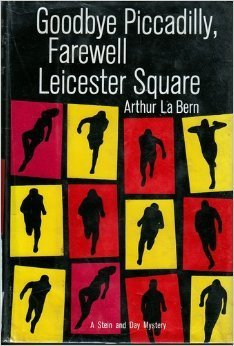Endlessly grim and surprisingly graphic for its time, this novel served as the basis for Alfred Hitchcock's 1972 film, Frenzy. Originally titled Goodbye Piccadilly, Farewell Leicester Square, Frenzy was adapted for the big screen by Anthony Shaffer (Sleuth, The Wicker Man); and, by the way, that film adaptation is superior to the novel in every way. However, since this is a book review, we'll skip over the film and get to the business at hand.
Richard Blamey, a luckless alcoholic and former war-hero, finds himself slumming it as a bartender in a noisy Covent Garden pub. Already disheartened by the prison cell suicide of a friend and fellow war veteran, Blamey loses an allegedly surefire bet on a horse race, rendering him penniless and even more miserable. In desperation, he pays a visit to his caring ex-wife, who just happens to run a successful marital agency in the neighborhood. However, due to Blamey's drunkenness and self-loathing, a loud argument ensues in her office. A play-nice dinner with his generous ex finds Blamey a few pounds richer, if none the wiser. In many ways, he is an exceptionally stupid man. Things go from bad to worse as a psychopathic sex deviant appears to be shadowing Blamey's movements, gruesomely dispatching the women in his orbit. Naturally, Blamey, ever the hothead, becomes the prime suspect and a game of cat-and-mouse ensues with Blamey attempting to outwit and outrun the Murder Squad charged with finding him. Only one investigator harbors doubts about Blamey's guilt but none of his superiors are interested in hearing his theories: they want the case closed. Now. Meanwhile, the seemingly-normal serial killer, unhindered and unsuspected, continues to remain free to plot more mischief behind the scenes.
Frenzy is well-written enough but lacking in suspense, especially once the identity of the killer is revealed halfway through the book. The kills and sexual assaults are sufficiently graphic and repugnant to repel many readers: a few descriptive passages almost feel like precursors to Bret Easton Ellis's 1991 shocker, American Psycho (though, admittedly, Ellis's book is vastly more disturbing). The not-particularly-bright Blamey makes a compelling antihero who is dislikable enough to make him difficult to care about. And yet I did. That's why, after a numbingly dull courtroom drama plays out across way too many pages, I was furious when Blamey finds himself in a perilous situation and suddenly the book just stops. It doesn't end, it stops. Sort of like a French movie, it just stops right in the middle of what should be the climactic scene. The reader is left dangling. There is no satisfaction. There is no release. It is literary anorgasmia is what it is. At least Hitchcock's film offered a hint of closure.






Comments
Post a Comment